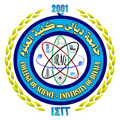College of Sciences | University of Diyala
Department of Biotechnology
About Department
The Department of Biotechnology was established in the academic year 2016-2017. The department is successfully running undergraduate four-year degree programme (BSc) in Biotechnology. The department has been contributing to high-quality research in front line areas of Biotechnology. The department members are collaborate with scientists from national and international institute namely Rutgers, The State University of New Jersey, Swansea University, University of Baghdad, Institute for Genetic Engineering and Biotechnologies.
What is Biotechnology?
The term "biotechnology" is consist of two parts “bio” and “technology”. “Bio” means the use of biological processes and “technology” means the application (solve problems or make useful products). Biotechnologist are helping people worldwide in their quest for a healthier lifestyle and also contribute to improving people's standards of living. According to The European Federation of Biotechnology (EFB) considers biotechnology as:
“The integration of natural sciences and organisms, cells, parts thereof, and molecular analogues for products and services”. As a multidisciplinary applied science, the study of biotechnology may be further divided into several branches:
Red biotechnology (Medical Biotechnology), e.g. utilizing organisms for the production of novel drugs.
Green biotechnology (Agricultural Biotechnology), e.g. development of pest-resistant grains and the accelerated evolution of disease-resistant animals.
Blue biotechnology (Marine Biotechnology), e.g. derived or developed products from a wide variety of marine and aquatic animals and plants, controlling the proliferation of noxious water-borne organisms.
White biotechnology (Industrial Biotechnology), e.g. production of new chemicals and pharmaceutical or the development of new fuels for vehicles energy, materials and polymers, using renewable raw materials..

The Department of Biotechnology periodically organizes workshops, laboratory training courses and seminars for the overall development of students and the staff. The department members regularly attend International Conferences and Seminars with in the country and abroad and present research papers. The research findings are published in Journals of high repute.
The department has four well established laboratories with instruments such as Thermalcycler, Microplate reader, Gel electrophoresis, Gel Documentation, NanoDrop, Static Incubators, Cooling Shaker Incubators, Cooling centrifuge, Millipore Unit, UV-Vis and Spectrophotometer, Rotary vacuum evaporator, Sonicator bath, HPLC.
Programme Outline
Year 1
- Principles of Biotechnology
- Organic Chemistry
- Analytical Chemistry
- General Biology
- Biocomputing
- Biophysics
- Biostatics
- English Language
Year 2
- Biochemistry
- General Microbiology
- Environmental Biotechnology
- Biosafety and Risk Assessment
- Cell Biology
- Medical Microbiology
- Genetics
- Plant Physiology
- Microbial Physiology
- Animal Physiology
Year 3
- Molecular Biology
- Immunology
- Food Microbiology
- Animal Tissue Culture
- Antibiotics
- Virology
- Sera and Vaccines
- Cellular Genetics
- Mycology
- Microbial Genetics
- Experimental Design and Academic Writing
Year 4
- Immunogenetics
- Enzymology
- Industrial Microbiology
- Graduation Research
- Pharmaceutical Biotechnology
- Toxicology
- Plant Tissue Culture
- Genetic Engineering
- Plant Chemistry
- Medical Biotechnology
- Fermentations
- Bioinformatics
Career Options
The Department of Biotechnology provide educational opportunities to students for preparing them to pursue higher studies for the development of their career in different areas. Job opportunities in biotechnology are set to escalate continuously. Graduates will have excellent career opportunities in areas as diverse as the agricultural, medical, pharmaceutical, environmental and the food and manufacturing industries.
Research areas
Research areas in Biotechnology at the Department of Biotechnology/UOD include:
- Immunogenetics
- Microbial Biotechnology
- Environmental Biotechnology
- Natural Products
- Toxins
- Bioinformatics


